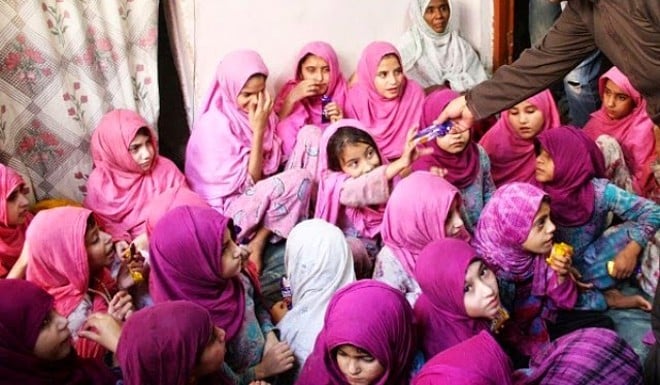
Increasingly, the poverty-stricken households are sending their children to madrassas -- as in the case of 36 girls from Bajaur recovered from Karachi and Bahawalpur

Twenty six girls aged between 6 and 12 from war-struck Bajaur were recovered from a lower-middle class neighbourhood in Karachi on November 28. Hours later in another raid, police recovered 10 more girls from Bahawalpur.
These 36 little girls had been sent away by their parents to study at an unregistered madrassa at old Karachi’s Guru Mandir. The owner of the madrassa, who the girls called "Baji", had outsourced the upkeep of the girls to other women who owed her money.
Treating these girls like commodities reflects how vulnerable the state’s children are in the absence of proper schools. Twenty five million children in the country remain out of school, according to a recent report by an NGO Alif Ailaan, pointing to a massive failure of the state when it comes to educating its children.
Private schools and madrassas with free food and shelter, then, fill the vaccum. "The girls belonged to poor families. They had been sent away to study in the city so that there would be fewer mouths to feed. The madrassa was imparting religious education which the families preferred," said Rubina Qaimkhani, minister for social welfare, who kept the girls at a shelter before they were dispatched to their families.
This is not the first time a case of inhuman treatment has been meted out at a madrassa. In 2011, students were found chained inside a seminary. The management had used chains to discipline the students, many of whom were mentally challenged.
Experts claim that despite such cases numbers of madrassa are on the rise --mainly because they provide social security.
"In the absence of state schooling and dwindling poverty, the madrassa acts as an umbrella of sorts where food, education and boarding comes free of cost," says Rana Asif, a child rights activist, continuing, "There is extreme poverty in war-torn Bajaur Agency and southern Punjab and sending off children to bigger cities like Karachi to study at a madrassa or work translates into lesser mouths to feed".
Admitting a child into an un-registered madrassa comes with added benefit --no documentation in the form of an identity card, passport or birth certificate.
For vulnerable communities this option is a blessing in disguise.
Ali Muhammad, a 28 year old Rohingya Muslim was born in a slum in Ibrahim Hyderi, a coastal village on the outskirts of Karachi. An illegal immigrant, he often guised as a Bengali, who lived in Pakistan before the partition. "I could never get admission in a private school because they asked for my birth certificate."
To make ends meet, he worked at a carpet factory in the evening and sought education at a local madrassah. "The education which I got here transformed me from an animal walking on two feet to a human being. When our parents came to Pakistan, they did not even know they had to wash their hands after they answered the call of nature."
Muhammad is now doing his PhD in Islamic Law. Madrassas are getting popular among the 10,000 households of second generation Rohingya Muslims. Many of these madrassas are supported by the right wing Jamaat-e-Islami.
Take a walk through this neighbourhood, and one will spot a madrassa every few kilometres. During school hours, these buildings brim with girls and boys. The result is rising extremism in the locality.
In Orangi Town, after ethnic tensions erupted in 2011, about 25 government schools shut down permanently. Locals claim that this gap has been filled in by religious madrassas most of which are unregistered. Parts of this neighbourhood are hot-beds for Taliban militants and no-go areas for polio teams.
It was in 2002, during Musharraf’s era, that the Madrassa Registration Ordinance (MRO) was first introduced, making it compulsory for all madrassas to register with the Pakistan Madrassa Education Board and their provincial branches.
Under the MRO, all madrassas were encouraged to teach English, Urdu, Math and Science along with religious education.
The ordinance also compels each registered madrassa to maintain accounts and submit an annual report to the provincial body.
Foreign students and teachers cannot enter a registered madrassa without obtaining a No-Objection Certificate from the Interior ministry.
"But the ordinance is just a piece of paper, easily ignorable. Unregistered madrassas mushroom in the city," says Zia-ur-Rehman, a research analyst. "Needless to say, they are often funded by oil-rich Arab countries that propagate a certain ideology which leads to extremism."
Note: An earlier version of this article incorrectly implied that parts of Ibrahim Hyderi are hot-beds for Taliban and no-go areas for polio workers. The error is regretted.